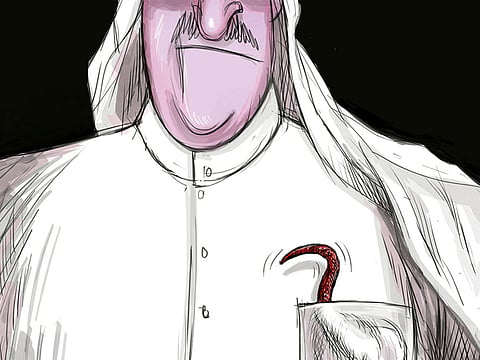Qatar’s guarantees could end its isolation
There can be no stability in the Arab world if Doha continues to foster trouble in the region

Back in April 2002, US Marine Corps General Anthony Zinni arrived in Ramallah, meeting with then-besieged Palestinian President Yasser Arafat, hoping to hammer out a truce, followed by peace, between him and his arch-enemy, Ariel Sharon.
Those talks famously collapsed but Arafat milked them till the end, perhaps wrongly believing that the US was using Zinni to turn a new page with him and mend broken fences since outbreak of the second intifada two years earlier. By 2004, however, Arafat was dead and so was peace on the Arab-Israeli front. Zinni disappeared from the region and joined the corporate world, only to re-emerge this summer as a special US envoy to the Gulf, tasked with solving the dispute between Qatar and the Quartet. Working closely with him is Tim Lenderking, Deputy Assistant Secretary for Arabian Gulf Affairs at the Near Eastern Bureau at the Department of State.
Shaikh Tamim is certainly no Arafat — he hasn’t spent a lifetime in the underground, advancing a historic cause — moving heaven and earth to attain statehood and international recognition for his people.
Arafat was being punished for standing up to a brutal enemy that occupied his country; Shaikh Tamim is being quarantined for spreading extremism in the Arab world. Fast forward to 2017, the Quartet is composed of brother countries in the GCC, who have nothing but concern, affection, and respect for the people of Qatar.
The two US envoys are peddling a “road map” for peace, put forth by their boss, Secretary of State Rex Tillerson. It focuses broadly on gradual de-escalation in the Gulf while changing Qatar’s behaviour, based on six principles put forth by the Quartet. On paper this should be easy, as the four Arab states have laid down demands like shutting down Al Jazeera, expelling the Muslim Brotherhood from Doha, and cutting ties with Iran.
What Shaikh Tamim is expected to deliver is ending support for terrorist groups (without naming them), a term that can apply to a wide variety of organisations operating underneath his umbrella, mainly Al Qaida-affiliated militias in Syria, Iraq, Libya, and Egypt.
READ MORE:
Qatar and the 'money diplomacy strategy'
Outlook looks grim for Qatar’s banking sector
Why the Qatar crisis is here to stay?
UAE: Changes to Qatar anti-terror law positive
Qatar-linked individuals, groups involved in terrorism
More revelations of Qatar’s plots in Libya
Al Jazeera: How it incites terror, hatred
Crisis: Qatar fails to grasp the reality
Poem urges Qatar to 'return to GCC'
He needs to stop sending them money, to stop their incitement, and to make sure that neither they nor any Qatari official is involved in destabilising member states in the GCC. Basically the emir is expected to do what he had signed off back in 2013-2014 but has since failed to honour or deliver. One of those clauses was “not to interfere in the internal affairs of other GCC members and not to harbour people engaged in activities damaging to those countries.”
The present terms were seemingly left ambiguous to give Tillerson’s diplomats room to manoeuvre in their talks with Shaikh Tamim, while seeking guarantees that Qatar will abide by the will of the Quartet, or suffer continuation of this protracted crisis.
Many are wondering what kind of guarantees would be seen as adequate for Saudi Arabia, the UAE, Bahrain, and Egypt. For starters, Shaikh Tamim can change the editorial policy of Al Jazeera, promising to accept its forced knock off satellite networks if it continues to spread venom against Riyadh and Abu Dhabi.
He needs to come up with plenty of confidence-building measures and for starters stop airing sermons of Shaikh Yousuf Al Qaradawi, the spiritual godfather of the Muslim Brotherhood. If Shaikh Tamim muzzles the controversial Egyptian cleric — rather than expel him — this might be seen as an encouraging move by the Quartet. So far he has not done that. Far from it, he received him at the palace during Ramadan and had his picture taken and distributed, kissing Al Qaradawi’s hand.
Distancing himself from the Egyptian Brotherhood and its Palestinian branch, Hamas, would be seen as a good sign, if followed by a pledge from the emir that these groups will never again be welcome in Qatar nor will they be given open access to the studios of Al Jazeera. A public apology would be nice, and the Quartet states may accept it and help him save face, if they sense that he is sincere.
This is what Zinni might try to achieve when he meets with Shaikh Tamim in Doha — talking some good sense into the young ruler who still fails to realise that one cannot have stability in the Arab and Muslim worlds if Doha continues to foster trouble in the region.
Sami Moubayed is a Syrian historian and former Carnegie scholar. He is also author of Under the Black Flag: At the frontier of the New Jihad.



